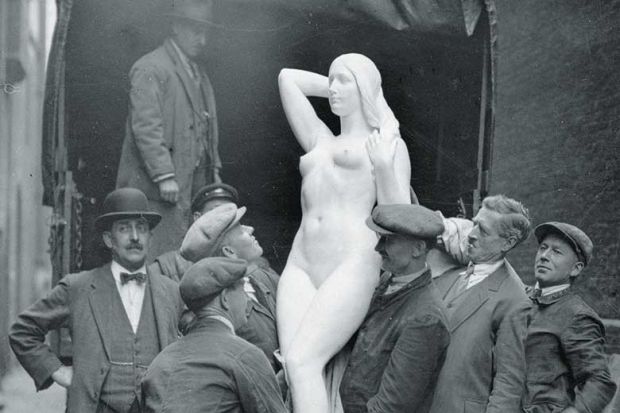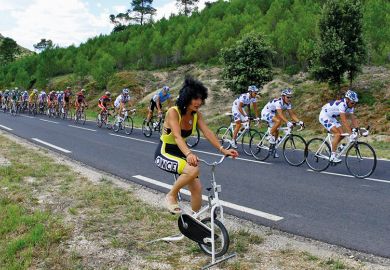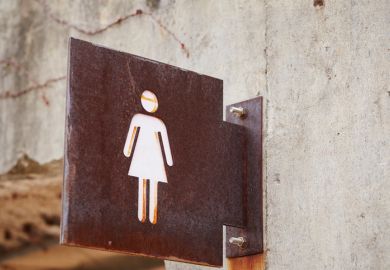Traditionally, English syntax has favoured masculinity where power and professional progress are concerned. “May the best man win” or “the best man for the job” are throwaway phrases that have nestled far too comfortably into everyday language.
These precepts don’t sit well with me. In June 2017, I became the very first minister for higher education in the history of the Republic of Ireland. As an educator and politician, I am fully aware that a two-tier system of power dominates certain sectors of society, often for no good reason other than it is simply the norm.
By this I mean that many women who are as capable and efficient as their male peers still work in an environment where their gender holds them back. Let’s call this what it is: gender inequality.
Take the tertiary education sector in Ireland, for example. I am conscious that this is not an isolated illustration for women in Ireland, but it is a place where I as minister for higher education can make far-reaching improvements.
Statistics tell us that while women make up half the staff in tertiary education, only a quarter of university professors are female. Look deeper and we find that there has never been a female president in a state-funded university – not one in 426 years.
Think on this for a moment – since the establishment of Ireland’s first university in 1592, no woman has ever been president or provost.
Given the exemplary calibre of female professors, past and present, educating a nation of future leaders in our hallowed lecture halls, there is no reason why women should continue to play second fiddle when it comes to seniority. On paper, gender equality has been enshrined in our legislation for the tertiary sector for many years, so higher education institutions (HEIs) must by law promote gender balance.
There have been some improvements – all the country’s seven public universities have now achieved Athena SWAN institutional bronze status, a charter adopted in Ireland in 2015 that promotes equality and commits to advancing the careers of women in higher education and research.
Nevertheless, progress is far too slow. Just 24 per cent of professors were women in 2017, a paltry increase on 21 per cent in 2016. Just two out of 14 presidents at Ireland’s institutes of technology are women.
But changes are afoot. On 12 November, I published a much-needed action plan on gender equality for universities and institutes of technology. Accelerating Gender Equality in Irish Higher Education Institutions is the culmination of a year’s work involving the Department of Education’s gender equality task force, and I believe that it sets out some radical actions to effect organisational and cultural change and advance equality in the higher education sector.
How will I do this? As minister for higher education, in conjunction with the Department of Education, I have secured funding for new and additional senior academic leadership posts within our universities and institutes of technology to be targeted at areas where there is an under-representation of women. This is just one of myriad initiatives that will address and improve on the paltry proportion of women in senior positions. HEIs need to grasp the opportunity for change and know that their efforts are neither isolated nor will go unsupported.
On initial reading of this statement, some quarters may deem the effort to balance gender inequality with jobs for the girls as contradictory – does it discriminate against men?
But hear me out. This is not about keeping men out of high-powered positions in the third-level sector. We don’t need to. We have excellent men charged with important senior positions across education. Instead, this is about affording women of equal yet unrecognised proficiency an opportunity that is often not available to them because of a traditional status quo that is badly in need of reform.
Since I made the announcement, there has been some backlash to the concept of “female-only posts” and concerns that lesser-qualified women will secure posts to the detriment of higher-qualified men.
Let me put your mind at ease. The Senior Academic Leadership Initiative that is being proposed represents new and additional posts over and above what was already in the system. All the opportunities available to men before this initiative (circa 50 professor posts annually) are still available to them today.
What has changed is that HEIs will now have an added incentive to be proactive in recruiting and promoting talented women. Where the HEIs have fulfilled the criteria set by the Higher Education Authority (HEA), the post will be fully funded by the HEA. The criteria include: having a suitability qualified candidate in an area of significant female under-representation; and where they can show that they have previously tried other approaches but failed to address the gender imbalance; and where they can demonstrate that they have an institutional gender action plan to address organisational and cultural barriers to gender equality.
This initiative represents a novel approach to accelerating gender balance at senior levels and has been developed from several successful international approaches. Although it may seem radical to some, I will not apologise or shirk from my responsibility to make the third-level sector an equal one.
I’ll conclude with a powerful quote: “Here’s to strong women. May we know them. May we be them. May we raise them.”
Here’s to a level playing field for women in academia. They are strong, we do know them. What an inspiration it will be for young girls to know that they can secure that top job in the tertiary sector by being the right person and not the wrong gender.
Mary Mitchell O’Connor is minister for higher education at the Department of Education in the Republic of Ireland.
POSTSCRIPT:
Print headline: I want women in academia to have a level playing field
Register to continue
Why register?
- Registration is free and only takes a moment
- Once registered, you can read 3 articles a month
- Sign up for our newsletter
Subscribe
Or subscribe for unlimited access to:
- Unlimited access to news, views, insights & reviews
- Digital editions
- Digital access to THE’s university and college rankings analysis
Already registered or a current subscriber?




